Unit 12 Organizational Behavior Report: Tesco's Culture & Motivation
VerifiedAdded on 2023/01/12
|10
|2618
|20
Report
AI Summary
This report analyzes the organizational behavior of Tesco, examining how culture, politics, and power influence individual and team performance. It delves into Handy's model of organizational culture, exploring power, role, task, and person cultures, with a focus on the effectiveness of task culture for Tesco. The report also discusses the impact of organizational politics and various types of power, such as expert, reward, coercive, and referent power. Furthermore, it evaluates content and process theories of motivation, specifically Maslow's hierarchy of needs and equity theory, along with motivational techniques like monetary and non-monetary benefits. The report concludes by suggesting opportunities for improved performance, such as expanding into new markets and implementing the latest technologies. The analysis aims to provide insights into how Tesco can optimize its organizational structure and motivational strategies to achieve its goals effectively.
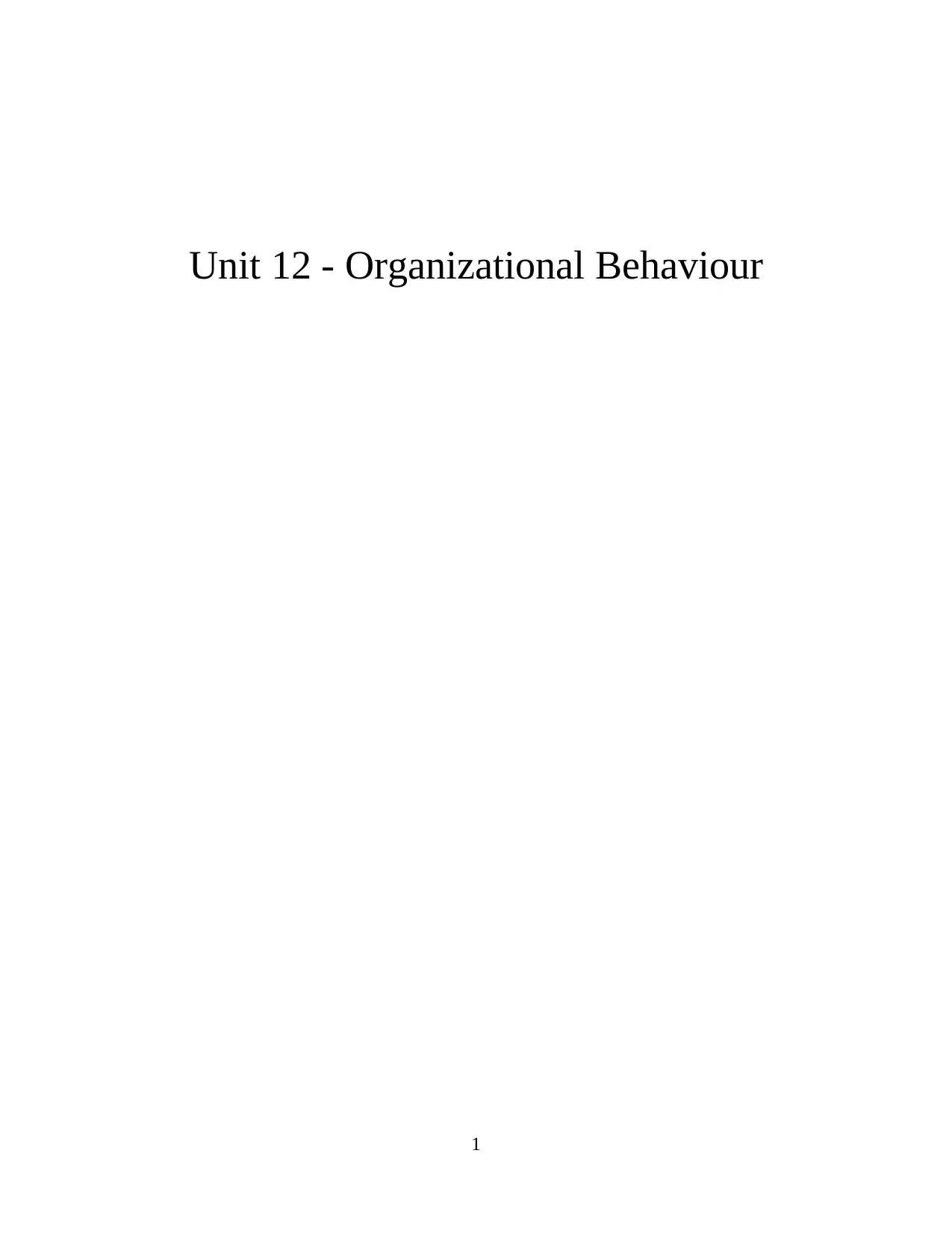
Unit 12 - Organizational Behaviour
1
1
Paraphrase This Document
Need a fresh take? Get an instant paraphrase of this document with our AI Paraphraser
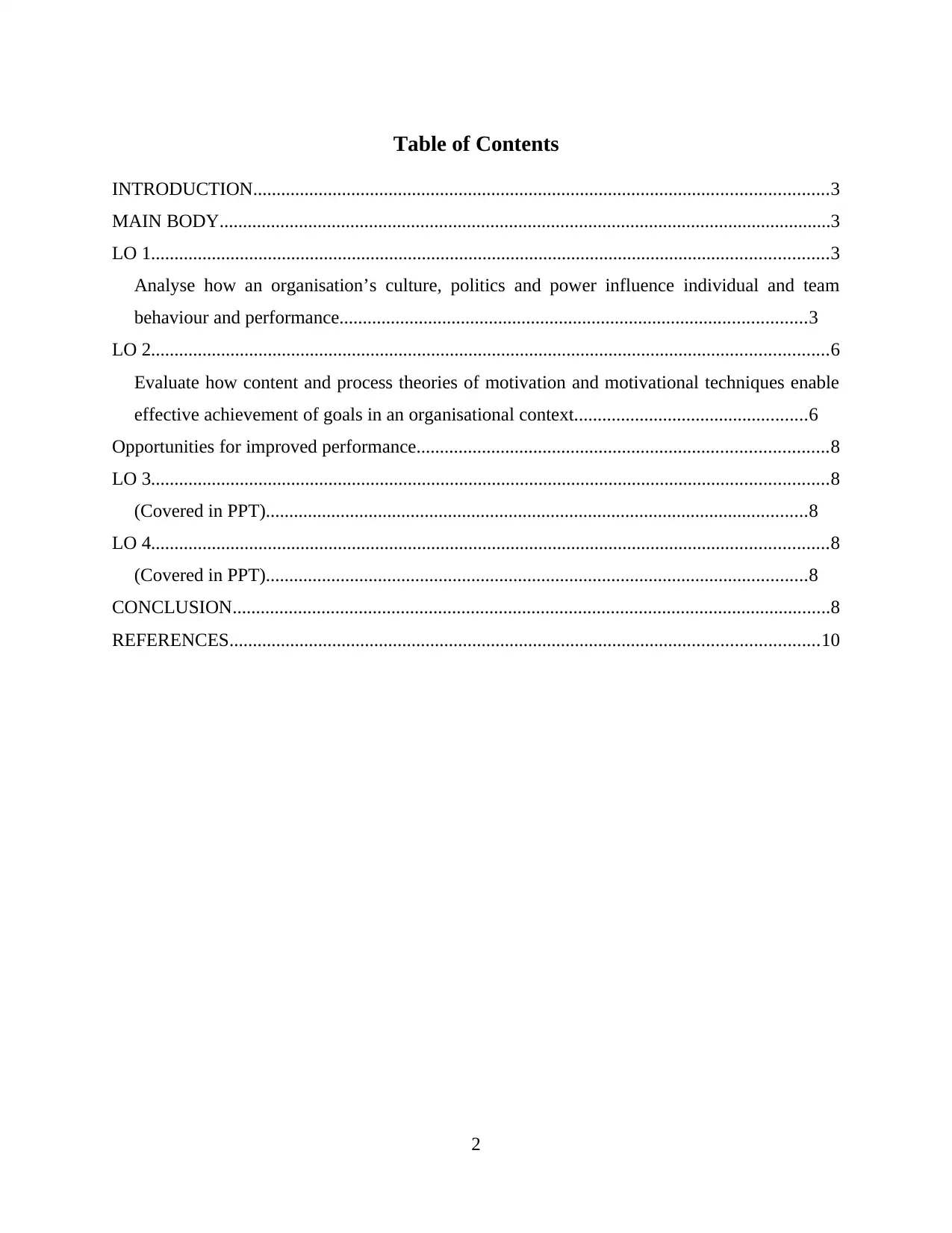
Table of Contents
INTRODUCTION...........................................................................................................................3
MAIN BODY...................................................................................................................................3
LO 1.................................................................................................................................................3
Analyse how an organisation’s culture, politics and power influence individual and team
behaviour and performance....................................................................................................3
LO 2.................................................................................................................................................6
Evaluate how content and process theories of motivation and motivational techniques enable
effective achievement of goals in an organisational context..................................................6
Opportunities for improved performance........................................................................................8
LO 3.................................................................................................................................................8
(Covered in PPT)....................................................................................................................8
LO 4.................................................................................................................................................8
(Covered in PPT)....................................................................................................................8
CONCLUSION................................................................................................................................8
REFERENCES..............................................................................................................................10
2
INTRODUCTION...........................................................................................................................3
MAIN BODY...................................................................................................................................3
LO 1.................................................................................................................................................3
Analyse how an organisation’s culture, politics and power influence individual and team
behaviour and performance....................................................................................................3
LO 2.................................................................................................................................................6
Evaluate how content and process theories of motivation and motivational techniques enable
effective achievement of goals in an organisational context..................................................6
Opportunities for improved performance........................................................................................8
LO 3.................................................................................................................................................8
(Covered in PPT)....................................................................................................................8
LO 4.................................................................................................................................................8
(Covered in PPT)....................................................................................................................8
CONCLUSION................................................................................................................................8
REFERENCES..............................................................................................................................10
2
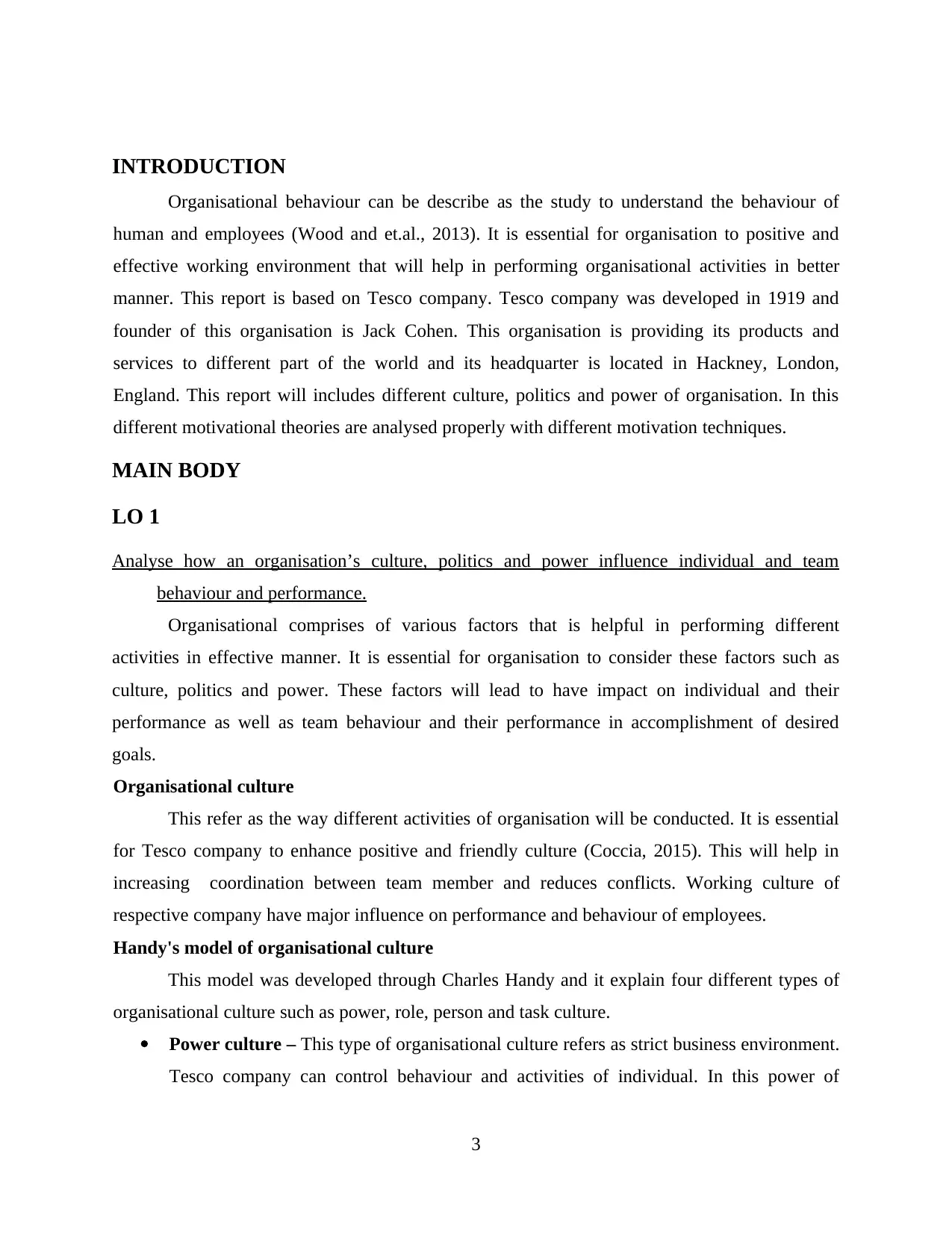
INTRODUCTION
Organisational behaviour can be describe as the study to understand the behaviour of
human and employees (Wood and et.al., 2013). It is essential for organisation to positive and
effective working environment that will help in performing organisational activities in better
manner. This report is based on Tesco company. Tesco company was developed in 1919 and
founder of this organisation is Jack Cohen. This organisation is providing its products and
services to different part of the world and its headquarter is located in Hackney, London,
England. This report will includes different culture, politics and power of organisation. In this
different motivational theories are analysed properly with different motivation techniques.
MAIN BODY
LO 1
Analyse how an organisation’s culture, politics and power influence individual and team
behaviour and performance.
Organisational comprises of various factors that is helpful in performing different
activities in effective manner. It is essential for organisation to consider these factors such as
culture, politics and power. These factors will lead to have impact on individual and their
performance as well as team behaviour and their performance in accomplishment of desired
goals.
Organisational culture
This refer as the way different activities of organisation will be conducted. It is essential
for Tesco company to enhance positive and friendly culture (Coccia, 2015). This will help in
increasing coordination between team member and reduces conflicts. Working culture of
respective company have major influence on performance and behaviour of employees.
Handy's model of organisational culture
This model was developed through Charles Handy and it explain four different types of
organisational culture such as power, role, person and task culture.
Power culture – This type of organisational culture refers as strict business environment.
Tesco company can control behaviour and activities of individual. In this power of
3
Organisational behaviour can be describe as the study to understand the behaviour of
human and employees (Wood and et.al., 2013). It is essential for organisation to positive and
effective working environment that will help in performing organisational activities in better
manner. This report is based on Tesco company. Tesco company was developed in 1919 and
founder of this organisation is Jack Cohen. This organisation is providing its products and
services to different part of the world and its headquarter is located in Hackney, London,
England. This report will includes different culture, politics and power of organisation. In this
different motivational theories are analysed properly with different motivation techniques.
MAIN BODY
LO 1
Analyse how an organisation’s culture, politics and power influence individual and team
behaviour and performance.
Organisational comprises of various factors that is helpful in performing different
activities in effective manner. It is essential for organisation to consider these factors such as
culture, politics and power. These factors will lead to have impact on individual and their
performance as well as team behaviour and their performance in accomplishment of desired
goals.
Organisational culture
This refer as the way different activities of organisation will be conducted. It is essential
for Tesco company to enhance positive and friendly culture (Coccia, 2015). This will help in
increasing coordination between team member and reduces conflicts. Working culture of
respective company have major influence on performance and behaviour of employees.
Handy's model of organisational culture
This model was developed through Charles Handy and it explain four different types of
organisational culture such as power, role, person and task culture.
Power culture – This type of organisational culture refers as strict business environment.
Tesco company can control behaviour and activities of individual. In this power of
3
⊘ This is a preview!⊘
Do you want full access?
Subscribe today to unlock all pages.

Trusted by 1+ million students worldwide
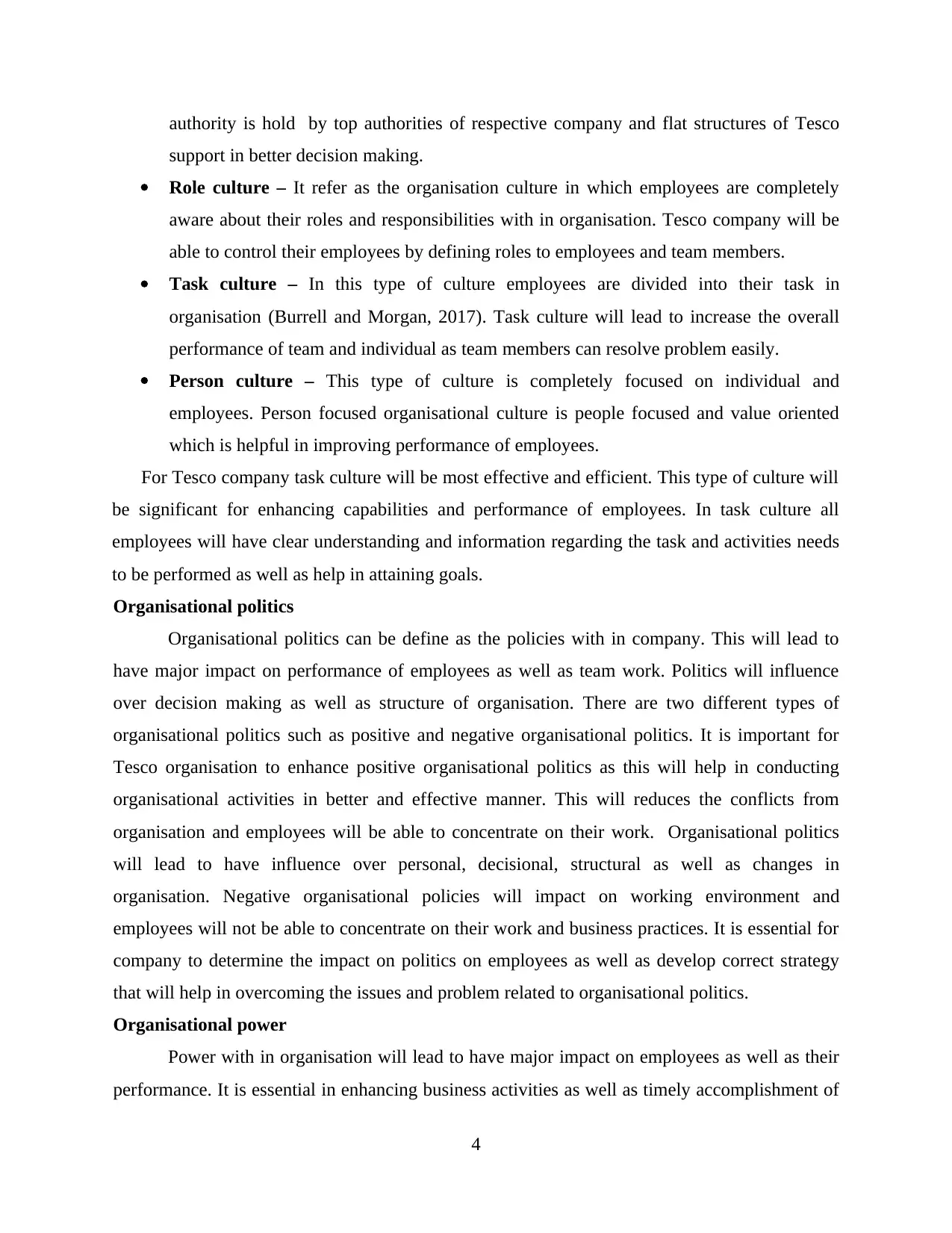
authority is hold by top authorities of respective company and flat structures of Tesco
support in better decision making.
Role culture – It refer as the organisation culture in which employees are completely
aware about their roles and responsibilities with in organisation. Tesco company will be
able to control their employees by defining roles to employees and team members.
Task culture – In this type of culture employees are divided into their task in
organisation (Burrell and Morgan, 2017). Task culture will lead to increase the overall
performance of team and individual as team members can resolve problem easily.
Person culture – This type of culture is completely focused on individual and
employees. Person focused organisational culture is people focused and value oriented
which is helpful in improving performance of employees.
For Tesco company task culture will be most effective and efficient. This type of culture will
be significant for enhancing capabilities and performance of employees. In task culture all
employees will have clear understanding and information regarding the task and activities needs
to be performed as well as help in attaining goals.
Organisational politics
Organisational politics can be define as the policies with in company. This will lead to
have major impact on performance of employees as well as team work. Politics will influence
over decision making as well as structure of organisation. There are two different types of
organisational politics such as positive and negative organisational politics. It is important for
Tesco organisation to enhance positive organisational politics as this will help in conducting
organisational activities in better and effective manner. This will reduces the conflicts from
organisation and employees will be able to concentrate on their work. Organisational politics
will lead to have influence over personal, decisional, structural as well as changes in
organisation. Negative organisational policies will impact on working environment and
employees will not be able to concentrate on their work and business practices. It is essential for
company to determine the impact on politics on employees as well as develop correct strategy
that will help in overcoming the issues and problem related to organisational politics.
Organisational power
Power with in organisation will lead to have major impact on employees as well as their
performance. It is essential in enhancing business activities as well as timely accomplishment of
4
support in better decision making.
Role culture – It refer as the organisation culture in which employees are completely
aware about their roles and responsibilities with in organisation. Tesco company will be
able to control their employees by defining roles to employees and team members.
Task culture – In this type of culture employees are divided into their task in
organisation (Burrell and Morgan, 2017). Task culture will lead to increase the overall
performance of team and individual as team members can resolve problem easily.
Person culture – This type of culture is completely focused on individual and
employees. Person focused organisational culture is people focused and value oriented
which is helpful in improving performance of employees.
For Tesco company task culture will be most effective and efficient. This type of culture will
be significant for enhancing capabilities and performance of employees. In task culture all
employees will have clear understanding and information regarding the task and activities needs
to be performed as well as help in attaining goals.
Organisational politics
Organisational politics can be define as the policies with in company. This will lead to
have major impact on performance of employees as well as team work. Politics will influence
over decision making as well as structure of organisation. There are two different types of
organisational politics such as positive and negative organisational politics. It is important for
Tesco organisation to enhance positive organisational politics as this will help in conducting
organisational activities in better and effective manner. This will reduces the conflicts from
organisation and employees will be able to concentrate on their work. Organisational politics
will lead to have influence over personal, decisional, structural as well as changes in
organisation. Negative organisational policies will impact on working environment and
employees will not be able to concentrate on their work and business practices. It is essential for
company to determine the impact on politics on employees as well as develop correct strategy
that will help in overcoming the issues and problem related to organisational politics.
Organisational power
Power with in organisation will lead to have major impact on employees as well as their
performance. It is essential in enhancing business activities as well as timely accomplishment of
4
Paraphrase This Document
Need a fresh take? Get an instant paraphrase of this document with our AI Paraphraser
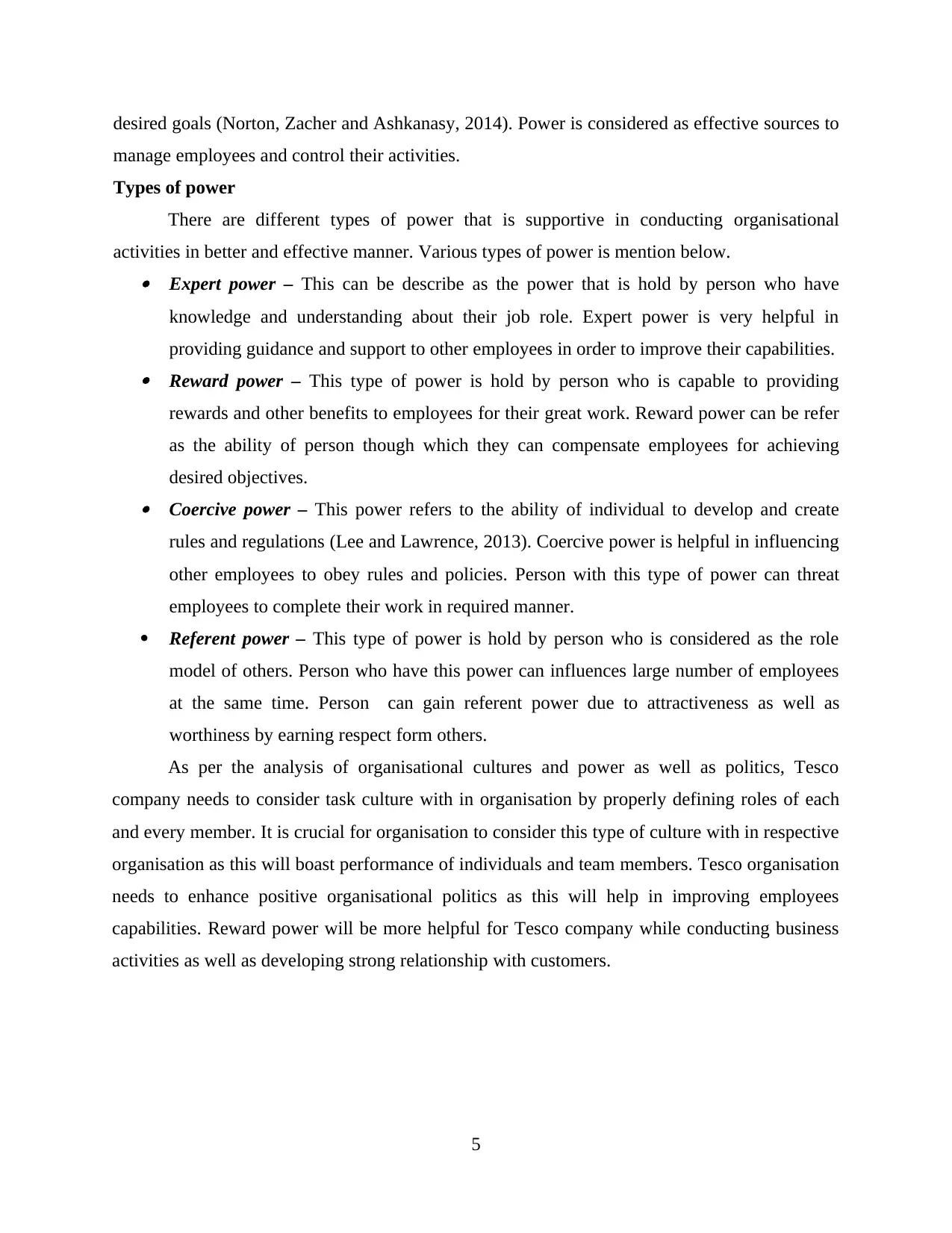
desired goals (Norton, Zacher and Ashkanasy, 2014). Power is considered as effective sources to
manage employees and control their activities.
Types of power
There are different types of power that is supportive in conducting organisational
activities in better and effective manner. Various types of power is mention below. Expert power – This can be describe as the power that is hold by person who have
knowledge and understanding about their job role. Expert power is very helpful in
providing guidance and support to other employees in order to improve their capabilities. Reward power – This type of power is hold by person who is capable to providing
rewards and other benefits to employees for their great work. Reward power can be refer
as the ability of person though which they can compensate employees for achieving
desired objectives. Coercive power – This power refers to the ability of individual to develop and create
rules and regulations (Lee and Lawrence, 2013). Coercive power is helpful in influencing
other employees to obey rules and policies. Person with this type of power can threat
employees to complete their work in required manner.
Referent power – This type of power is hold by person who is considered as the role
model of others. Person who have this power can influences large number of employees
at the same time. Person can gain referent power due to attractiveness as well as
worthiness by earning respect form others.
As per the analysis of organisational cultures and power as well as politics, Tesco
company needs to consider task culture with in organisation by properly defining roles of each
and every member. It is crucial for organisation to consider this type of culture with in respective
organisation as this will boast performance of individuals and team members. Tesco organisation
needs to enhance positive organisational politics as this will help in improving employees
capabilities. Reward power will be more helpful for Tesco company while conducting business
activities as well as developing strong relationship with customers.
5
manage employees and control their activities.
Types of power
There are different types of power that is supportive in conducting organisational
activities in better and effective manner. Various types of power is mention below. Expert power – This can be describe as the power that is hold by person who have
knowledge and understanding about their job role. Expert power is very helpful in
providing guidance and support to other employees in order to improve their capabilities. Reward power – This type of power is hold by person who is capable to providing
rewards and other benefits to employees for their great work. Reward power can be refer
as the ability of person though which they can compensate employees for achieving
desired objectives. Coercive power – This power refers to the ability of individual to develop and create
rules and regulations (Lee and Lawrence, 2013). Coercive power is helpful in influencing
other employees to obey rules and policies. Person with this type of power can threat
employees to complete their work in required manner.
Referent power – This type of power is hold by person who is considered as the role
model of others. Person who have this power can influences large number of employees
at the same time. Person can gain referent power due to attractiveness as well as
worthiness by earning respect form others.
As per the analysis of organisational cultures and power as well as politics, Tesco
company needs to consider task culture with in organisation by properly defining roles of each
and every member. It is crucial for organisation to consider this type of culture with in respective
organisation as this will boast performance of individuals and team members. Tesco organisation
needs to enhance positive organisational politics as this will help in improving employees
capabilities. Reward power will be more helpful for Tesco company while conducting business
activities as well as developing strong relationship with customers.
5
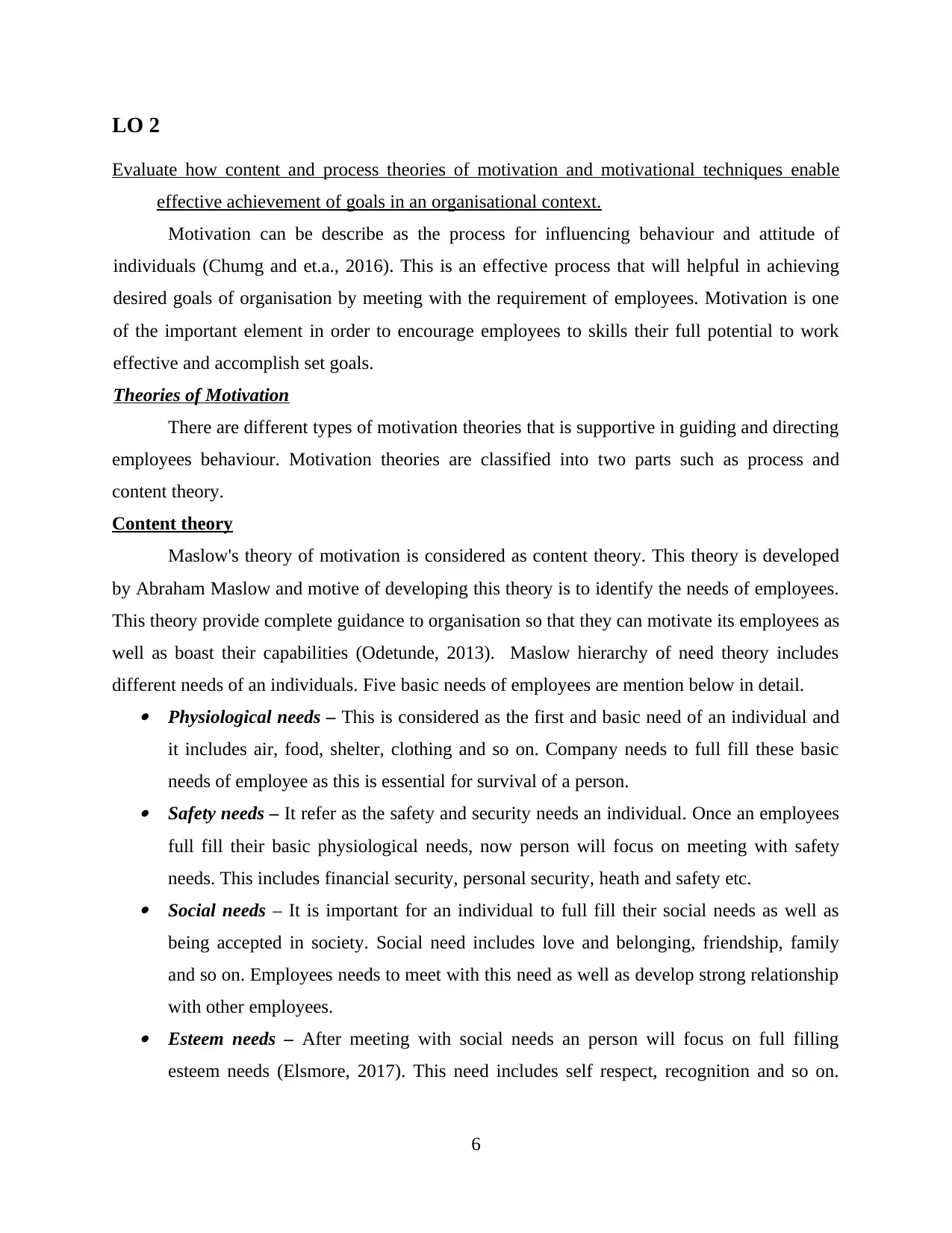
LO 2
Evaluate how content and process theories of motivation and motivational techniques enable
effective achievement of goals in an organisational context.
Motivation can be describe as the process for influencing behaviour and attitude of
individuals (Chumg and et.a., 2016). This is an effective process that will helpful in achieving
desired goals of organisation by meeting with the requirement of employees. Motivation is one
of the important element in order to encourage employees to skills their full potential to work
effective and accomplish set goals.
Theories of Motivation
There are different types of motivation theories that is supportive in guiding and directing
employees behaviour. Motivation theories are classified into two parts such as process and
content theory.
Content theory
Maslow's theory of motivation is considered as content theory. This theory is developed
by Abraham Maslow and motive of developing this theory is to identify the needs of employees.
This theory provide complete guidance to organisation so that they can motivate its employees as
well as boast their capabilities (Odetunde, 2013). Maslow hierarchy of need theory includes
different needs of an individuals. Five basic needs of employees are mention below in detail. Physiological needs – This is considered as the first and basic need of an individual and
it includes air, food, shelter, clothing and so on. Company needs to full fill these basic
needs of employee as this is essential for survival of a person. Safety needs – It refer as the safety and security needs an individual. Once an employees
full fill their basic physiological needs, now person will focus on meeting with safety
needs. This includes financial security, personal security, heath and safety etc. Social needs – It is important for an individual to full fill their social needs as well as
being accepted in society. Social need includes love and belonging, friendship, family
and so on. Employees needs to meet with this need as well as develop strong relationship
with other employees. Esteem needs – After meeting with social needs an person will focus on full filling
esteem needs (Elsmore, 2017). This need includes self respect, recognition and so on.
6
Evaluate how content and process theories of motivation and motivational techniques enable
effective achievement of goals in an organisational context.
Motivation can be describe as the process for influencing behaviour and attitude of
individuals (Chumg and et.a., 2016). This is an effective process that will helpful in achieving
desired goals of organisation by meeting with the requirement of employees. Motivation is one
of the important element in order to encourage employees to skills their full potential to work
effective and accomplish set goals.
Theories of Motivation
There are different types of motivation theories that is supportive in guiding and directing
employees behaviour. Motivation theories are classified into two parts such as process and
content theory.
Content theory
Maslow's theory of motivation is considered as content theory. This theory is developed
by Abraham Maslow and motive of developing this theory is to identify the needs of employees.
This theory provide complete guidance to organisation so that they can motivate its employees as
well as boast their capabilities (Odetunde, 2013). Maslow hierarchy of need theory includes
different needs of an individuals. Five basic needs of employees are mention below in detail. Physiological needs – This is considered as the first and basic need of an individual and
it includes air, food, shelter, clothing and so on. Company needs to full fill these basic
needs of employee as this is essential for survival of a person. Safety needs – It refer as the safety and security needs an individual. Once an employees
full fill their basic physiological needs, now person will focus on meeting with safety
needs. This includes financial security, personal security, heath and safety etc. Social needs – It is important for an individual to full fill their social needs as well as
being accepted in society. Social need includes love and belonging, friendship, family
and so on. Employees needs to meet with this need as well as develop strong relationship
with other employees. Esteem needs – After meeting with social needs an person will focus on full filling
esteem needs (Elsmore, 2017). This need includes self respect, recognition and so on.
6
⊘ This is a preview!⊘
Do you want full access?
Subscribe today to unlock all pages.

Trusted by 1+ million students worldwide
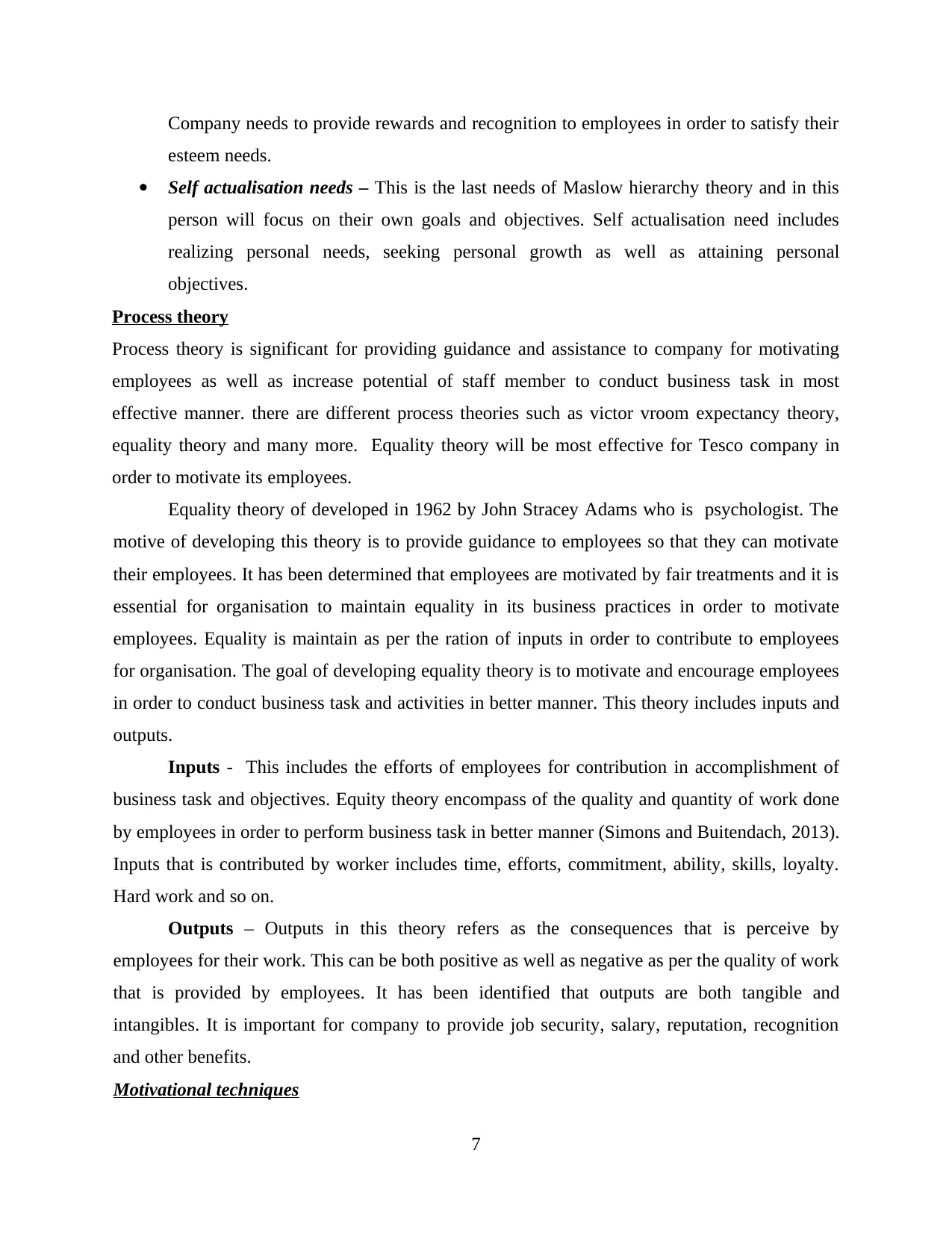
Company needs to provide rewards and recognition to employees in order to satisfy their
esteem needs.
Self actualisation needs – This is the last needs of Maslow hierarchy theory and in this
person will focus on their own goals and objectives. Self actualisation need includes
realizing personal needs, seeking personal growth as well as attaining personal
objectives.
Process theory
Process theory is significant for providing guidance and assistance to company for motivating
employees as well as increase potential of staff member to conduct business task in most
effective manner. there are different process theories such as victor vroom expectancy theory,
equality theory and many more. Equality theory will be most effective for Tesco company in
order to motivate its employees.
Equality theory of developed in 1962 by John Stracey Adams who is psychologist. The
motive of developing this theory is to provide guidance to employees so that they can motivate
their employees. It has been determined that employees are motivated by fair treatments and it is
essential for organisation to maintain equality in its business practices in order to motivate
employees. Equality is maintain as per the ration of inputs in order to contribute to employees
for organisation. The goal of developing equality theory is to motivate and encourage employees
in order to conduct business task and activities in better manner. This theory includes inputs and
outputs.
Inputs - This includes the efforts of employees for contribution in accomplishment of
business task and objectives. Equity theory encompass of the quality and quantity of work done
by employees in order to perform business task in better manner (Simons and Buitendach, 2013).
Inputs that is contributed by worker includes time, efforts, commitment, ability, skills, loyalty.
Hard work and so on.
Outputs – Outputs in this theory refers as the consequences that is perceive by
employees for their work. This can be both positive as well as negative as per the quality of work
that is provided by employees. It has been identified that outputs are both tangible and
intangibles. It is important for company to provide job security, salary, reputation, recognition
and other benefits.
Motivational techniques
7
esteem needs.
Self actualisation needs – This is the last needs of Maslow hierarchy theory and in this
person will focus on their own goals and objectives. Self actualisation need includes
realizing personal needs, seeking personal growth as well as attaining personal
objectives.
Process theory
Process theory is significant for providing guidance and assistance to company for motivating
employees as well as increase potential of staff member to conduct business task in most
effective manner. there are different process theories such as victor vroom expectancy theory,
equality theory and many more. Equality theory will be most effective for Tesco company in
order to motivate its employees.
Equality theory of developed in 1962 by John Stracey Adams who is psychologist. The
motive of developing this theory is to provide guidance to employees so that they can motivate
their employees. It has been determined that employees are motivated by fair treatments and it is
essential for organisation to maintain equality in its business practices in order to motivate
employees. Equality is maintain as per the ration of inputs in order to contribute to employees
for organisation. The goal of developing equality theory is to motivate and encourage employees
in order to conduct business task and activities in better manner. This theory includes inputs and
outputs.
Inputs - This includes the efforts of employees for contribution in accomplishment of
business task and objectives. Equity theory encompass of the quality and quantity of work done
by employees in order to perform business task in better manner (Simons and Buitendach, 2013).
Inputs that is contributed by worker includes time, efforts, commitment, ability, skills, loyalty.
Hard work and so on.
Outputs – Outputs in this theory refers as the consequences that is perceive by
employees for their work. This can be both positive as well as negative as per the quality of work
that is provided by employees. It has been identified that outputs are both tangible and
intangibles. It is important for company to provide job security, salary, reputation, recognition
and other benefits.
Motivational techniques
7
Paraphrase This Document
Need a fresh take? Get an instant paraphrase of this document with our AI Paraphraser
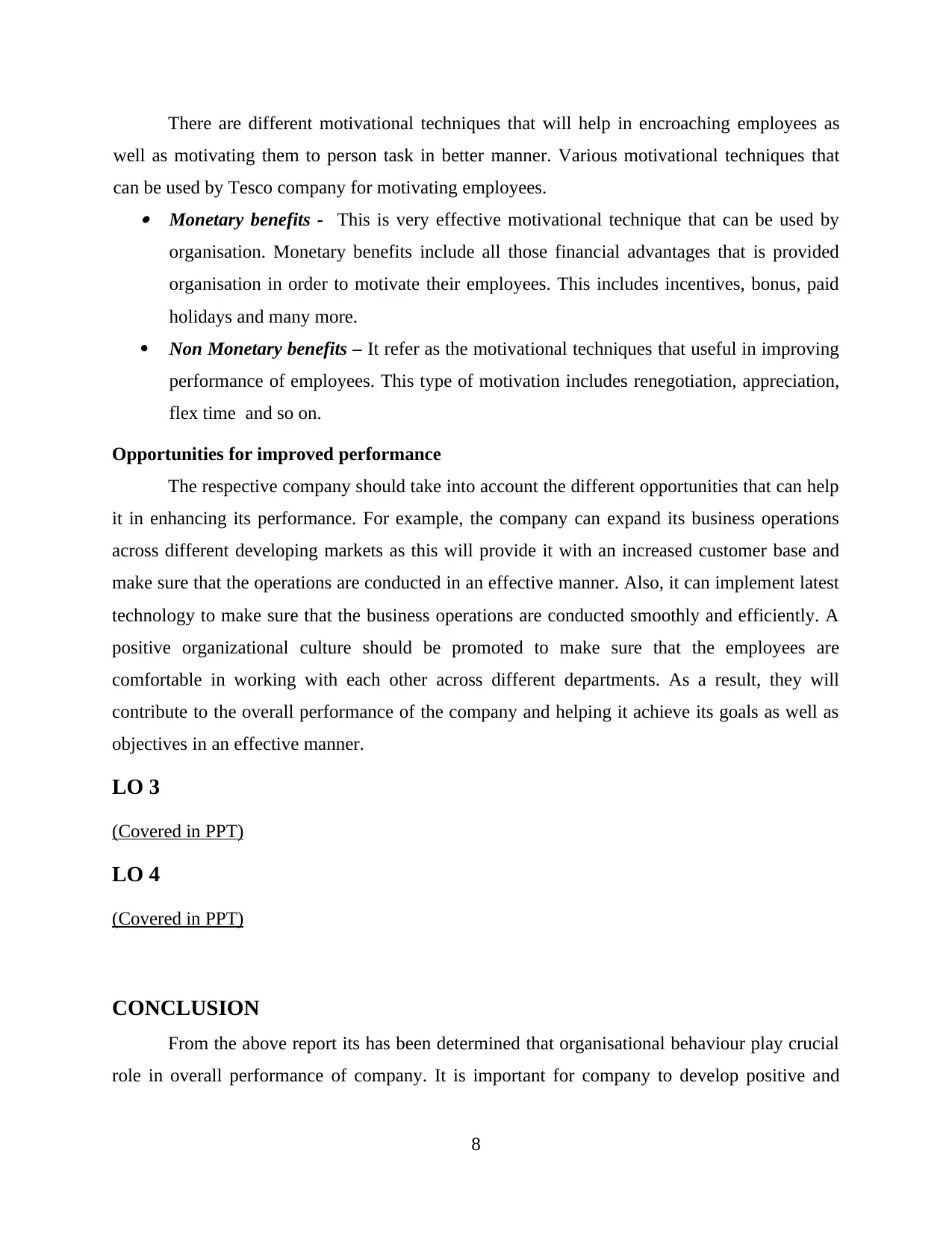
There are different motivational techniques that will help in encroaching employees as
well as motivating them to person task in better manner. Various motivational techniques that
can be used by Tesco company for motivating employees. Monetary benefits - This is very effective motivational technique that can be used by
organisation. Monetary benefits include all those financial advantages that is provided
organisation in order to motivate their employees. This includes incentives, bonus, paid
holidays and many more.
Non Monetary benefits – It refer as the motivational techniques that useful in improving
performance of employees. This type of motivation includes renegotiation, appreciation,
flex time and so on.
Opportunities for improved performance
The respective company should take into account the different opportunities that can help
it in enhancing its performance. For example, the company can expand its business operations
across different developing markets as this will provide it with an increased customer base and
make sure that the operations are conducted in an effective manner. Also, it can implement latest
technology to make sure that the business operations are conducted smoothly and efficiently. A
positive organizational culture should be promoted to make sure that the employees are
comfortable in working with each other across different departments. As a result, they will
contribute to the overall performance of the company and helping it achieve its goals as well as
objectives in an effective manner.
LO 3
(Covered in PPT)
LO 4
(Covered in PPT)
CONCLUSION
From the above report its has been determined that organisational behaviour play crucial
role in overall performance of company. It is important for company to develop positive and
8
well as motivating them to person task in better manner. Various motivational techniques that
can be used by Tesco company for motivating employees. Monetary benefits - This is very effective motivational technique that can be used by
organisation. Monetary benefits include all those financial advantages that is provided
organisation in order to motivate their employees. This includes incentives, bonus, paid
holidays and many more.
Non Monetary benefits – It refer as the motivational techniques that useful in improving
performance of employees. This type of motivation includes renegotiation, appreciation,
flex time and so on.
Opportunities for improved performance
The respective company should take into account the different opportunities that can help
it in enhancing its performance. For example, the company can expand its business operations
across different developing markets as this will provide it with an increased customer base and
make sure that the operations are conducted in an effective manner. Also, it can implement latest
technology to make sure that the business operations are conducted smoothly and efficiently. A
positive organizational culture should be promoted to make sure that the employees are
comfortable in working with each other across different departments. As a result, they will
contribute to the overall performance of the company and helping it achieve its goals as well as
objectives in an effective manner.
LO 3
(Covered in PPT)
LO 4
(Covered in PPT)
CONCLUSION
From the above report its has been determined that organisational behaviour play crucial
role in overall performance of company. It is important for company to develop positive and
8
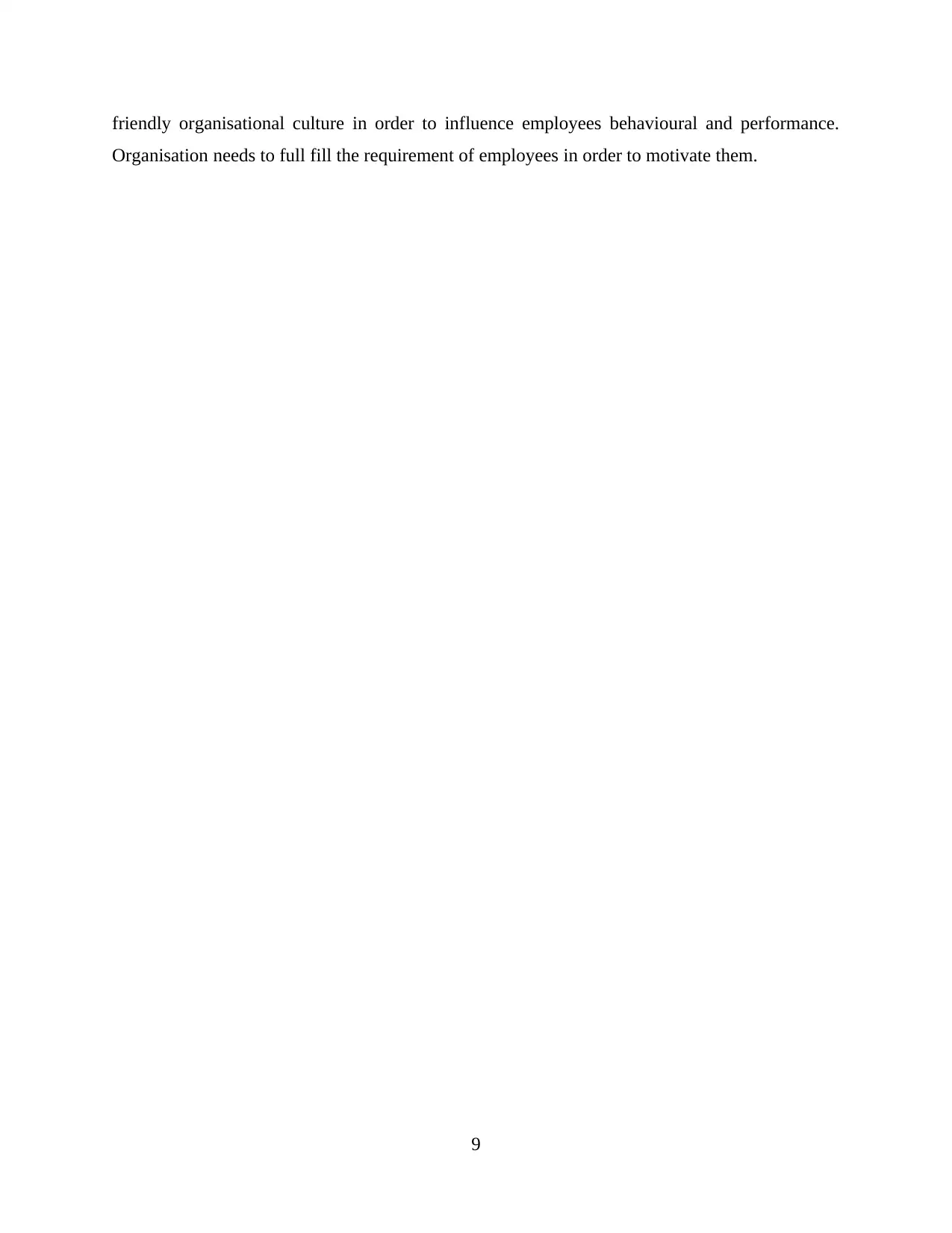
friendly organisational culture in order to influence employees behavioural and performance.
Organisation needs to full fill the requirement of employees in order to motivate them.
9
Organisation needs to full fill the requirement of employees in order to motivate them.
9
⊘ This is a preview!⊘
Do you want full access?
Subscribe today to unlock all pages.

Trusted by 1+ million students worldwide
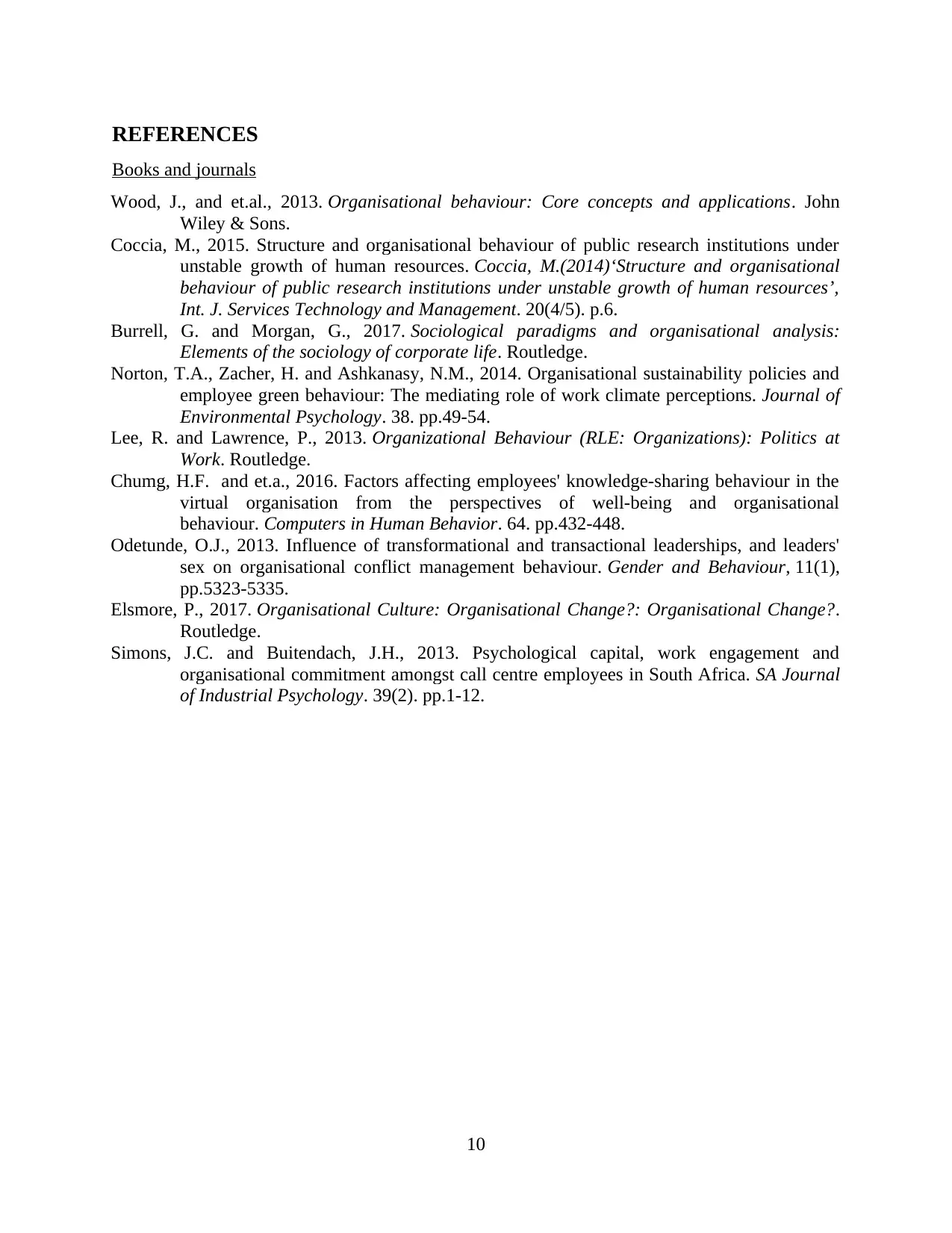
REFERENCES
Books and journals
Wood, J., and et.al., 2013. Organisational behaviour: Core concepts and applications. John
Wiley & Sons.
Coccia, M., 2015. Structure and organisational behaviour of public research institutions under
unstable growth of human resources. Coccia, M.(2014)‘Structure and organisational
behaviour of public research institutions under unstable growth of human resources’,
Int. J. Services Technology and Management. 20(4/5). p.6.
Burrell, G. and Morgan, G., 2017. Sociological paradigms and organisational analysis:
Elements of the sociology of corporate life. Routledge.
Norton, T.A., Zacher, H. and Ashkanasy, N.M., 2014. Organisational sustainability policies and
employee green behaviour: The mediating role of work climate perceptions. Journal of
Environmental Psychology. 38. pp.49-54.
Lee, R. and Lawrence, P., 2013. Organizational Behaviour (RLE: Organizations): Politics at
Work. Routledge.
Chumg, H.F. and et.a., 2016. Factors affecting employees' knowledge-sharing behaviour in the
virtual organisation from the perspectives of well-being and organisational
behaviour. Computers in Human Behavior. 64. pp.432-448.
Odetunde, O.J., 2013. Influence of transformational and transactional leaderships, and leaders'
sex on organisational conflict management behaviour. Gender and Behaviour, 11(1),
pp.5323-5335.
Elsmore, P., 2017. Organisational Culture: Organisational Change?: Organisational Change?.
Routledge.
Simons, J.C. and Buitendach, J.H., 2013. Psychological capital, work engagement and
organisational commitment amongst call centre employees in South Africa. SA Journal
of Industrial Psychology. 39(2). pp.1-12.
10
Books and journals
Wood, J., and et.al., 2013. Organisational behaviour: Core concepts and applications. John
Wiley & Sons.
Coccia, M., 2015. Structure and organisational behaviour of public research institutions under
unstable growth of human resources. Coccia, M.(2014)‘Structure and organisational
behaviour of public research institutions under unstable growth of human resources’,
Int. J. Services Technology and Management. 20(4/5). p.6.
Burrell, G. and Morgan, G., 2017. Sociological paradigms and organisational analysis:
Elements of the sociology of corporate life. Routledge.
Norton, T.A., Zacher, H. and Ashkanasy, N.M., 2014. Organisational sustainability policies and
employee green behaviour: The mediating role of work climate perceptions. Journal of
Environmental Psychology. 38. pp.49-54.
Lee, R. and Lawrence, P., 2013. Organizational Behaviour (RLE: Organizations): Politics at
Work. Routledge.
Chumg, H.F. and et.a., 2016. Factors affecting employees' knowledge-sharing behaviour in the
virtual organisation from the perspectives of well-being and organisational
behaviour. Computers in Human Behavior. 64. pp.432-448.
Odetunde, O.J., 2013. Influence of transformational and transactional leaderships, and leaders'
sex on organisational conflict management behaviour. Gender and Behaviour, 11(1),
pp.5323-5335.
Elsmore, P., 2017. Organisational Culture: Organisational Change?: Organisational Change?.
Routledge.
Simons, J.C. and Buitendach, J.H., 2013. Psychological capital, work engagement and
organisational commitment amongst call centre employees in South Africa. SA Journal
of Industrial Psychology. 39(2). pp.1-12.
10
1 out of 10
Related Documents
Your All-in-One AI-Powered Toolkit for Academic Success.
+13062052269
info@desklib.com
Available 24*7 on WhatsApp / Email
![[object Object]](/_next/static/media/star-bottom.7253800d.svg)
Unlock your academic potential
Copyright © 2020–2026 A2Z Services. All Rights Reserved. Developed and managed by ZUCOL.





